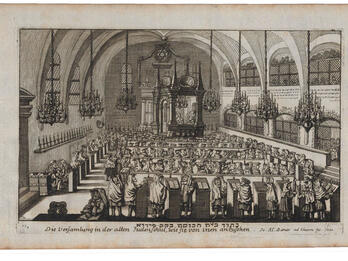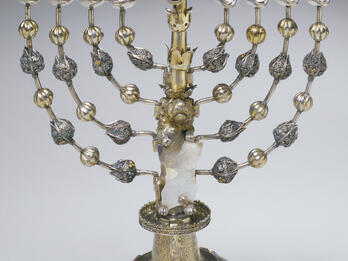Shevut Ya‘akov (The Captivity of Jacob)
Question 5: What blessing should one recite over coffee and tea, and is there any problem with drinking them on Passover?
Response: I will answer the questions in order. Regarding the blessing, it has already been clarified in the Responsa Paraḥ mateh Aharon, Part I, section 40, that one recites the blessing she-ha-kol.1 For it can be inferred from a statement of the Rosh [Asher ben Yeḥiel] in his responsa, and from comments of other great halakhic authorities, that these drinks are not comparable to the juice of boiled vegetables.2 The difference is that there one eats the boiled vegetables themselves, and therefore their juice has the same status as the boiled vegetables, whereas in the case of coffee and tea the substances themselves are not consumed in their natural state at all; rather, one simply drinks the liquid. Furthermore, they are not necessarily eaten together with bread. Consequently, they are similar to alcoholic beverages, over which one recites the blessing she-ha-kol; see his commentary there at length. The Responsa Halakhot ketanot §9 also ruled that one should recite the blessing she-ha-kol over coffee, and that this is the common practice; see there.
Likewise, with regard to tea, no one disputes that the blessing is she-ha-kol, as implied by the early ruling authorities. [ . . . ] This ruling is obvious and clear, and it is not in accordance with the Responsa Panim me’irot §95, who wrote that one recites the blessing “who creates the fruits of the ground” over them, just as one does over the juice of boiled vegetables. He was imprecise in his reasoning, since there it is different, since one consumes that juice together with bread, like the boiled vegetables themselves, as the Paraḥ mateh Aharon explained there at length, by means of clear proofs. Undoubtedly, he [the Panim me’irot, Meir ben Isaac Eisenstadt] failed to see this, but in any case it is the accepted custom.
As for the question of whether one may drink coffee on Passover, my approach is to rule that anything which was charred in fire before Passover by a Jew may be drunk on Passover. For even if we were to claim that it is a type of legume, or that it should be decreed as forbidden due to its similarity to a type of legume—despite the fact that it apparently grows on trees, and that it3 itself is merely a preventive decree—nevertheless, since it is charred before Passover to the extent that it is no longer fit to be eaten by a dog, there is no concern for a prohibition here at all.
Admittedly, it is stated in Oraḥ ḥayyim §442 that in any case it is forbidden to eat unleavened food that was charred before its time of prohibition, and it is merely permitted to keep it in one’s possession. However, that is referring to full-fledged unleavened food of grain. Regarding types of legumes, by contrast, there is certainly no prohibition involved when they were charred before their time of prohibition. In addition, many claim that that this is not a type of legume at all. Therefore, there is no need to be so stringent.
Notwithstanding the above, when it comes to tea, I have heard that many are particular not to drink it on Passover, since there is a concern about swindlers, as some people will use tea and subsequently dry it out in order to sell it. It is thus possible that it was initially used together with unleavened food. I have heard this opinion from impeccable individuals, and many others. Therefore, he who guards his soul will stay far from them (Proverbs 22:5), since on Passover one must keep especially distant from its prohibitions.
The fact that the early authorities did not mention these laws is because such drinks were not common among them in these regions; rather, they are new things that came up of late (Deuteronomy 32:17), as they were brought from the land of Turkey.
I have written what appears correct to me, in my humble opinion, the unimportant Jacob.
Translated by
.
Notes
[The standard blessings for all foods for which no special blessing is prescribed.—Trans.]
[See b. Berakhot 38b: over boiled vegetables, one recites the blessing: “who creates the fruits of the ground.”—Trans.]
[The prohibition against eating legumes on Passover.—Trans.]
Credits
Jacob (ben Joseph) Reischer, She’elot u-teshuvot shevut Yaʻakov (The Captivity of Jacob), vol. 2 (Offenbach: Bonaventura de Launoy, 1719) pp. 3a–b (no. 5).
Published in: The Posen Library of Jewish Culture and Civilization, vol. 5.




